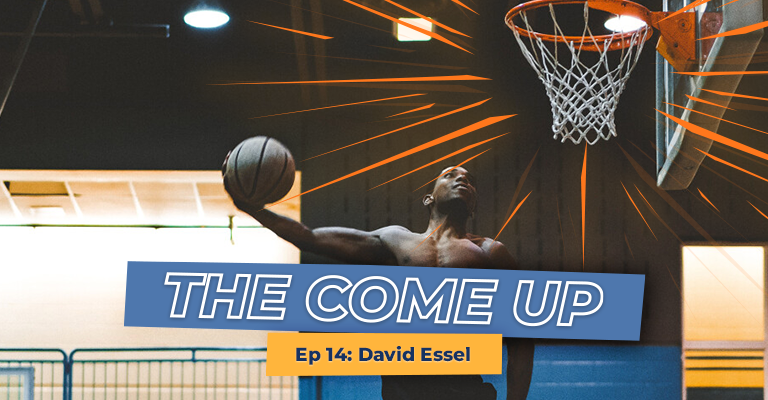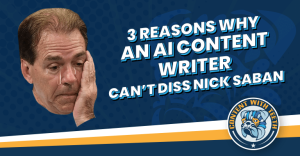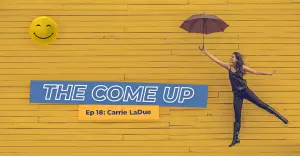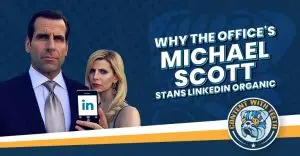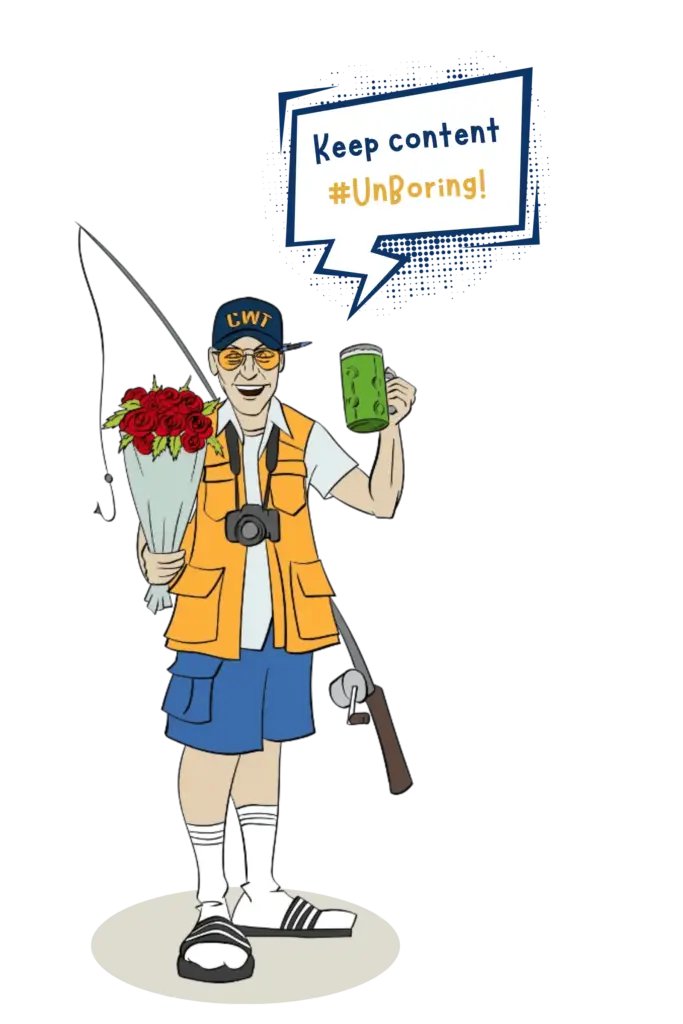The Come Up Episode 14 Video Transcript
Scrappy:
What up? What up? What up? What up? What up? Welcome to The Come Up, a video podcast featuring Southwest Florida entrepreneurs, business leaders. I’m Scrappy and we’re sponsored by Content With Teeth, a creative content agency with over 20 years of experience, right here in southwest Florida. As you can see by this fat head behind me, they do it really big, specializing in copywriting video production. If you need content, give them a call. And if you’d like to sponsor The Come Up or be a guest, hit me up @heyscrappy IG, or text Mike 21000.
I have to take a deep breath because I’m so excited. I’m so excited. Today’s guest, lifestyle guru and Life Coach, David Essel. He’s the author of 10 books, a syndicated radio host, international public speaker. You can check him out at mentalhealthhealing.org. David, what’s up my brother?
David Essel:
Scrappy, so great to be back with you, brother. And you have not changed a bit and I love it.
Scrappy:
The thing is, man, a lot of people say I have energy but not compared to you, that’s for sure.
David Essel:
You know, when you do what you have passion for, you obviously have passion for your work, I have for mine. It comes out of our pores, Scrappy, doesn’t it?
Scrappy:
Absolutely, absolutely. And when I was thinking about you and researching you and trying to get to know you better, I saw your commencement speech at Syracuse. I thought it was amazing.
David Essel:
Thank you. Oh my God, it was probably one of the greatest gifts I’ve ever been given, is to come back to my old alma mater, the university that I played basketball at and graduated from. And to be able to talk to the students and to the faculty, it was a dream come true. And that’s an understatement, Scrappy. It was so phenomenal.
Scrappy:
And you have such a vast knowledge, you’ve shared it with the students, it was really awesome. And your life coaching too, you’re so passionate about it. For those that don’t know exactly what life coaching is, can you break it on down?
David Essel:
Yeah, it’s pretty simple. As a coach, we take individuals who have goals that they want to accomplish and we help them lay out a format or a plan in order to accomplish those goals. There may be people that are struggling with issues they need to let go of, whether it’s addictions, maybe low self-confidence, low self worth. We help them remove those blocks. So really, coaches are all about accountability. We hold our client’s feet to the fire, we work with them at least once a week. We give them homework assignments so when they come in next week, if they have their homework done, they might get an A+, Scrappy. They may even get an apple on the way out the door. And if they end up not doing the work that we’ve asked them to do, then we get a chance to find out why. So it’s all about helping people to achieve goals and being that individual in the background, it is constantly nudging, pushing and encouraging them to greater success.
Scrappy:
You really have an interesting background from body building to Syracuse basketball, to yourself going through drug addiction and alcohol addiction. What made you flip the script and become a life coach?
David Essel:
Wow, that’s a great question. I graduated actually with a degree in sports psychology, so I was working with athletes for a number of years, but therapy is very different than life coaching. And in 1990, I had been already in sports psychology and working with people for over 10 years, and I started thinking there was something missing in my practice. I was really happy with the success my clients were getting, Scrappy, but there was something missing. And so, back then life coaching wasn’t even a title. We called ourselves lifestyle helpers or lifestyle coaches, or lifestyle mentors, but life coach wasn’t even a word back then.
But what I realized was this, one day a client came in and I gave her an assignment, a homework assignment. And the assignment was, why is it that you want to make this one change in your life so badly? You’re almost so angry you want to make this change. And so I said, I want you to write about it as an exercise. So when she came in the next week, I said, go ahead and read your homework to me. Now, in traditional psychotherapy, we don’t give homework assignments. We say, Hey, that was a great 55 minute session, Scrappy, I’ll see you next week. But all of a sudden I said, there’s something missing.
I gave her this assignment, she came back in, I said, now read it to me, and she couldn’t. She was hysterically crying. And I said, Wait a minute. You have this big goal you want to accomplish and the reason you want to accomplish it is on the paper in front of you, but you can’t read it to me. And she said, no. I said, let’s wait. We waited about five minutes. I said, now let’s try. She wanted to get in the best shape of her life to get back at her husband who had left her for a younger woman. So she was all about revenge. And right there in that one exercise with that one person, given that one assignment, I completely switched from a pure counselor in psychotherapy to someone who does what’s called now, life coaching, meaning that we give assignments.
So when I work with a client, every week they have homework assignments, reading assignments, writing assignments, and that’s what makes the biggest difference between a counselor and a coach. Counselors, we’re not trained to give assignments at the level that coaches are, but I love to combine both, Scrappy. The knowledge of psychotherapy, I think, is crucially important to help people change, but the action steps that we give them are just as important.
Scrappy:
Okay. There’s so much to it and you’re so articulate and we could be here, you and I, we could talk for hours, you and I, because I’m so fascinated with you. You’re utterly fascinating, David.
David Essel:
Thank you.
Scrappy:
What I thought we would do is maybe a word association. I’ll give you a word and give me a 30 second perspective on it, okay?
David Essel:
Okay.
Scrappy:
Depression.
David Essel:
More common than we think, more submerged than people know. And what I mean by that is that especially with what people have gone through with the pandemic, the changes that are out of our control, having to be at home with our kids while they’re trying to go to school online, and they’ve never done this before. Lots of people have this incredible frustration with what’s going on in the world. And what does that create? The feelings of lowness, that feeling of depression, that feeling of is it really worth it? Can I still make a difference with my body, money, et cetera, in the middle of a pandemic?
So depression is really a piece of hopelessness. I’ve gotten so overwhelmed with these changes out of my control. I just want to lay in bed. I just want to eat. I just want to drink. The end result of depression.
Scrappy:
Weight loss.
David Essel:
Oh my gosh. We have right now about 85% of the United States of America is either extremely overweight or obese. 85%.
Scrappy:
Wow.
David Essel:
It’s incredible. Now that’s gone up about 5% since the pandemic started, so we already had a huge issue. 80% of Americans overweight. Now it’s up to about 85%. And I’ll tell you what, the genetic part of it is about this big, Scrappy, there’s a very tiny genetic link to obesity. There is a link, but it’s very minor. It’s mainly that we’ve never really learned how to deal with our emotions, and so we use food as medication. Sugar, salt, white flour, fat, all go to the pleasure center of the brain, just like alcohol, nicotine, and everything else. So when people are using food to self-medicate, they don’t want to feel the loneliness, depression, anxiety that they’re going through.
Scrappy:
That feeds right into my next word, discipline.
David Essel:
Oh my gosh, the key to almost everything, Scrappy. So many people lose integrity with themselves because they say, starting tomorrow, I’m getting up at seven and I’m going for a 45 minute walk before I get ready for work. And then they don’t, which means now they’re breaking their own word against themselves. But individuals with discipline look at life totally differently. They say, if I say I’m going to do something, I’m going to, so that I respect myself and so that others respect me as well, Scrappy. Discipline is a key for all of us to be focused on, more so right now especially.
Scrappy:
And that goes back to discipline, they’re all kind of intertwined.
David Essel:
Very much so.
Scrappy:
You talk about depression, we can talk about anxiety, they all kind of go together in many different respects. How about finding a partner?
David Essel:
Oh my gosh. Right now with what’s happened in the last couple of years, there’s a lot of issues in relationships. And we always say people this, a relationship can only work if you are happy alone. Let that sink in. The only relationships that really have a chance of working is if you’re home on a Friday night and you have a great book and you’re happy. You’re home on a Saturday night and you’re knitting crochet, I don’t care what you’re doing, but you’re not drinking, you’re not overeating to numb your emotions, you’re not using pot to numb your emotions on the weekend when you’re alone. You can actually be alone and be happy.
That’s the number one key for people that are looking for relationships. And what we say to everyone that comes to me for relationship help is that our first goal is going to be to get you happy. Once you’re really content and happy with yourself, well guess what? The odds are, you’re going to attract other people that are content and happy with themselves as well. But if you attract people that are unhappy, they’re going to stick out like a sore thumb, because you’re so satisfied with yourself it isn’t going to be worth your time. You’ll walk away shortly.
So the number one goal before you even think about dating is saying, am I happy alone? Really happy alone? If the answer is yes, go find the great partner.
Scrappy:
That feeds into another word, co-dependency.
David Essel:
Oh, co-dependency. Scrappy, one of my favorite words in the world when it comes to, as a matter of fact, I just got done with a session with an 86 year old woman working on co-dependency. She is 86 and she says, David, I read your book on co-dependency, I am a full co-dependent, will you help me? Just had a session with her this morning. So co-dependency we labeled actually, Scrappy, in 2002, as the largest addiction in the world, and it still is today. Co-dependency is the person that’s afraid to rock the boat. They’re afraid to upset anyone. They’re afraid that their opinion may frustrate their partner, so they never give their opinion. That’s one side of co-dependency.
Another side of co-dependency is the person that always has to be right. They’re so co-dependent on being right, that even if all the facts in the world are placed in front of them that they’re incorrect, they’re going to fight to be right because they’re co-dependent on having to have the last word. They’re co-dependent on having to be correct. So this whole co-dependency goes in all these different directions. But we say this in an intimate relationship, the only way to shatter co-dependency in an intimate relationship is for both partners to agree. And this is going to sound so simple, but it’s so hard to be 110% honest with each other, always.
And Scrappy, that’s not an easy thing to do. There are many times in intimate relationships where we have to say to our partner, I’m very unhappy with the way that this is being handled. I’m very unhappy with our communication, or lack of. I’m really unhappy that you’ve shut down again. Or I’m really unhappy that you went out drinking again after we were trying to have a conversation. We’ve got to be honest with our partner. And it’s those thoughts and feelings, Scrappy, that we are not sharing, but that are eating us inside with our partner that destroys relationships in the long run, if not the short run.
Now, being honest and being a hundred percent filled with integrity with your partner is not easy and that doesn’t always mean they’re going to like you. This is crucial. The co-dependent says, no, I could never talk with my husband or wife about that because they may be upset with me. Pure co-dependency. The independent person says, my partner might be really upset with me, but we’ve got to find a way to work through this. That’s different.
Scrappy:
We’re playing Word association with my man, David Essel. And don’t forget, we’re sponsored by Content With Teeth, a creative ad agency with over 20 years of experience right here in Southwest Florida. As you can see from this fathead, we’re doing it really big, specializing in copywriting and video production. If you want to participate with us as a sponsor or guest, hit me up @heyscrappy IG, or text Mike at 21000.
David, you mentioned an 86 year old woman, and I really care about the elderly to a large degree. In many respects, they don’t have a purpose. I don’t want to get in a big question, this is word association. Let’s just say purpose.
David Essel:
Okay. Well, purpose can be volunteering. Purpose can be going into the children’s hospital and being an aid there. I think it’s crucial to have purpose. Let’s talk about addiction. Since COVID happened, the first or second year of the pandemic, we had a thousand percent increase in online alcohol sales. We know that the elderly are falling victim to alcohol left and right. The two largest groups that are struggling with alcoholism, well, it’s always been college-aged students, and that still is true. And the second group that’s struggling the most with alcoholism is our seniors, because they’re bored, because they have no purpose, as you said, because they have nothing to take their time. And so we encourage every senior out there. I’ve met several seniors that are bagging groceries in grocery stores to give them a purpose, to give them something to do. They may need the money or they may not, but they’re always in a great mood at the place I go to, and we’re talking in their eighties.
So I think having purpose is crucial. I am not a fan of retirement. I’m really not.
Scrappy:
How about people stuck in their career, you know, mid range?
David Essel:
Yeah, there’s a lot right now. There’s a lot of fear in the world of career changes, because people don’t know what’s going up next. What type of a vaccine are we going to be talking about, or a virus that we’re going to talk about next? So many companies have cut back dramatically. There’s one client that worked in Atlanta, he was a very high ranking Vice President. I think they had about a thousand people in the building. And after a year of COVID, they decided to send everyone home. Now everyone works out of their home, no one works in the building anymore. Massive changes.
Now, for people who are adaptable to that kind of change, perfect. But for those people who are extreme extroverts who really do need human interaction much more than maybe you or I do, Scrappy, they would have to change careers. They would have to look at it and say, working out of home is terrible for me. I need structure. I need more organization. I need more people interaction. So get to know yourself. Its kind of like the theme we’re talking about today. Get to know yourself and then ask yourself this question. What’s the next best move for me personally?
And that’s not a selfish question, that’s just a realistic question. I’m stuck in a job I hate. What’s the next best move for me? Is it starting to redo my resume? Is it talking to my partner and saying, Hey, listen, I’m really unhappy here, are you willing to up and move if I can find something? But don’t get stuck in a situation that you’re extremely unhappy. Scrappy, life goes so fast. I’m 66, I never even knew I could get to 66 this fast.
Scrappy:
You look 56.
David Essel:
Thank you, brother. I swear I skipped 30 years somewhere, because I don’t know how this all happened. But when I say that, I have to realize my own mortality I have to realize to take advantage of every day. And I don’t mean that just from a success and money and all that kind of crap, I just mean from being happy, like being of service and making a difference and lifting other people which lifts us. I really think the purpose of life is all about that. So I want everyone to wake up to the reality that if you’re in a position that absolutely sucks and you see no way to heal it, then start to look for the alternative of moving on. And you may end up opening doorways that’ll blow your mind with the new people you’ll meet and the new experiences. And don’t be afraid of taking an entry level position or a lateral move. If it brings you joy and peace, my God, it’s not an entry position and it’s not a lateral move if it brings you joy and peace.
Scrappy:
Yeah, but one of the problems is, is there are people with three jobs or 50 hours a week and they have kids to feed and rent to pay, they feel stuck on a whole nother level. And I understand what you’re saying, find some peace and happiness and so forth, but it’s really difficult.
David Essel:
Oh, it is. And Scrappy, I know of several families, just like what you’re talking about. And one of the things we say with them is that there are times in life you cannot change your circumstances. There are times in life you have to keep that job to keep food on the table. There’s times in life you have to do it, but this is the time too, to find a special space for your own mental healing. Is it playing guitar 30 minutes a day, that gets your brain relaxed? Is it listening to classical music 20 minutes before going to bed?
So if you’re stuck in a position where you honestly know there’s no option for the next 12 months, or 24 months, find some special space for you. You still need that self care. You still need that self love. You know, I’ve never played guitar well. I took lessons a long time ago. I still have two guitars and I’m procrastinating like crazy on this, Scrappy, because even though I play terribly, when I have a guitar in my hand, I’m smiling.
Scrappy:
That’s nice.
David Essel:
I’m always smiling. And that tells me that I need to put more time into that.
Scrappy:
You’re feeding your subconscious.
David Essel:
So as you and I are talking, I’m even exposing that David Essel isn’t perfect, and I’ve got some new things I can do as well.
Scrappy:
David, you’ve given us so much great advice, so much knowledge and so forth. But what’s your problem? What are you dealing with?
David Essel:
Well, I just listed one. I’ve been procrastinating and I’m playing guitar for years now, getting back into lessons. I would say that, honestly Scrappy, the way that I feel, even though I don’t play well at all, the way I feel when I just take the guitar out of the case, tells me that it’s what I should be doing. And the other thing, it’s really easy. Even though I’ve been doing this work for 43 years, it’s really easy to fall into workaholism and then come out of it. And then you put all your time into your career and then you come out. And it can be exhausting. And the other thing I have to keep my eye on along with starting to play guitar, is that I’ve really got to keep watching how much I’m putting into work.
We’re in the middle of moving right now. I think this weekend we’re moving. We’re going to stay in the general area here. But I have found with my partner, and we were talking the other night, that after the move, I’ve really got to start to take some downtime. We’ve been pushing super hard. During the pandemic we’ve created four really powerful programs to help this country heal. We’ve put a ton of effort and time and money out there to try to make things available.
As a matter of fact, one of our programs, the most popular one that we created, is called Helping Americans Heal. It’s a free online program and it has gone wild. The number of people that are signing up, it costs nothing and every week you get an email with information on how to boost yourself during these times. Well, we do all that, but then I forget that I have to take care of myself and I have to boost myself, because no one can do it for us, Scrappy. My partner can’t take care of my self care, you can’t take care of my self care, I can’t pay a personal trainer to take care of my self care. So that’s the second thing I have to always be working at. And right now we see that I’ve hit that level of workaholism again. So after the 19th of August, we’re taking a stretch of time so I can chill and then be ready after the 1st of September to kick it again.
Scrappy:
Very cool, very cool. You’re certainly an entrepreneur. Do you have a big team?
David Essel:
That’s a great question, Scrappy. Before the pandemic we had 12 people on our staff. And then during the pandemic, most of it was because of, we just didn’t have the work for people to do. But we’ve got it down now to about four people. So we went from 12 to four. No, we don’t have a big staff, but we have really excellent people with incredible attitudes, Scrappy, and I am blessed to have these four rock stars on my team.
Scrappy:
The number one thing you can give to people in terms of advice, in just a sentence or a couple of words, a phrase, I’m guessing it’s inner mojo. What do you think it is?
David Essel:
I believe without any doubt at all, we need to be able to look in the mirror and come to a level of acceptance with who we are right now today, Scrappy, not wishing our body was different, not wishing our money was different, not wishing our partner was different. We need to come to acceptance, because when we get to acceptance and we can really learn to like ourselves right now today, without anything changes, we have now taken control of our life.
If we can be happy now with the pandemic, with the limitations maybe of finances, if we can find a way, and listen, we know there are people all over the world that are living in squalor, and they’re happy. We see the videos from other countries of kids with huge smiles that have nothing. We hear stories of like Giannis, the basketball star from Milwaukee Bucks, who grew up in Greece with nothing. They have a story on him and his brother’s lives right now. And they found happiness with no basketball shoes, playing basketball, for God’s sake. So I think we really need to find that self-acceptance and find a way to be happy today, even if life isn’t perfect. If we can reach that level, Scrappy, we have got life right there.
Scrappy:
Awesome, awesome. 50 years from now, I’m going to eulogize you. You’re going to give me a couple of index cards to help me out. What are they going to say?
David Essel:
He tried his best every day. He tried to love the homeless as much as his partner. He looked at life from a different perspective, was an incredibly independent human being, but his whole purpose on earth was to help others heal.
Scrappy:
You’ve already written that index card.
David Essel:
Scrappy, I’ve been doing this so long. I’ve known my purpose forever. That’s a fortunate thing. But I’ll say even knowing my purpose, you mentioned it earlier, for 30 years, I struggled with alcohol and cocaine. I had a failed suicide attempt in 1990. Life has not been roses and puppy dog tales the whole time. But the one thing that I can say that’s never changed is my purpose and my passion for the work I do. It doesn’t matter how many personal struggles I’ve gone through, losing my mom and dad in the last year and a half, one of the most horrendous things that anyone could ever go through. But through it all, I feel blessed that I have been in a position of helping others. And I think that’s the reason I’m here, and the reason I have a smile right now with you.
Scrappy:
You always have a smile as far as I’m concerned, it’s awesome. You’re uplifting me, David, right now in this moment.
David Essel:
Scrappy, I love it. And the other times we’ve had the interview, it’s been the same thing. Our energy is awesomely matched. You’re over the top just like I am, and I think it’s great, my brother.
Scrappy:
Awesome. Awesome, awesome, awesome. So we really appreciate you and we thank you for your time. One last question. Why Fort Myers? We’re a Southwest Florida Podcast, we celebrate Fort Myers. Why are you here? I mean, you could be anywhere, David.
David Essel:
Yeah, I could be anywhere. But the reason I’m here is that I’m a really laid back dude. And believe it or not, even though all my work is extroverted work, I’m an extreme introvert, Scrappy. My partner, Mia, and I, we have a very simple life. We live an amazingly simple life, there’s not much we need to be happy. And I’m not a city person. We were in Miami about eight weeks ago, and after two days I said, baby, I got to get out of here. And she lived in Miami for 10, 15 years and she loves it there, but it’s too much for me. Cities are too busy, too much traffic. I love Fort Myers area, Naples, Sarasota. I love this whole coast so much. And while we may move somewhere else in the future, it’ll probably be a very similar kind of laid back, a little area like this, Scrappy. I just love it here.
Scrappy:
I’m the same way. I’m from New York City and I live in Lehigh Acres on an acre, and I love every minute of it. My dog doesn’t have a leash.
David Essel:
Isn’t that awesome. That’s the way to have a dog.
Scrappy:
Oh man. Oh, absolutely. It’s a spiritual experience, man. And I really appreciate this moment. I adhere to Buddhism and I try to accept the fact this moment in time is what we have. David, thank you so much, we appreciate you. Content With Agency is sponsoring this. If you want to join us on a show, you can so by going to my IG, heyscrappy. Or just go to 21,000 and text Mike. Nothing but love for you, David.
David Essel:
Scrappy, nothing but love for you. And I’m so glad Content With Teeth is supporting the heck out of you, and all of your positive messages. Keep going strong, brother. And whatever you need me, I’m here for you.
Scrappy:
Thank you. But you know what I forgot? Go ahead and plug all your businesses real quick.
David Essel:
Oh my gosh. Hey, if people want to work with me one-on-one, addiction recovery, saving relationships, improving attitude, weight loss, we cover it all. Just go to talkdavid.com. If you want to join the free program, Helping Americans Heal, every week, you’re going to get content to lift your spirits. Talkdavid.com. I’m a speaker. If you’re a business and you want to bring in a speaker, talkdavid. So the only thing you got to remember is talkdavid.com.
Scrappy:
All right. Thanks again, buddy, I really appreciate your time.
David Essel:
Absolutely. Scrappy, I’ll see you soon.

